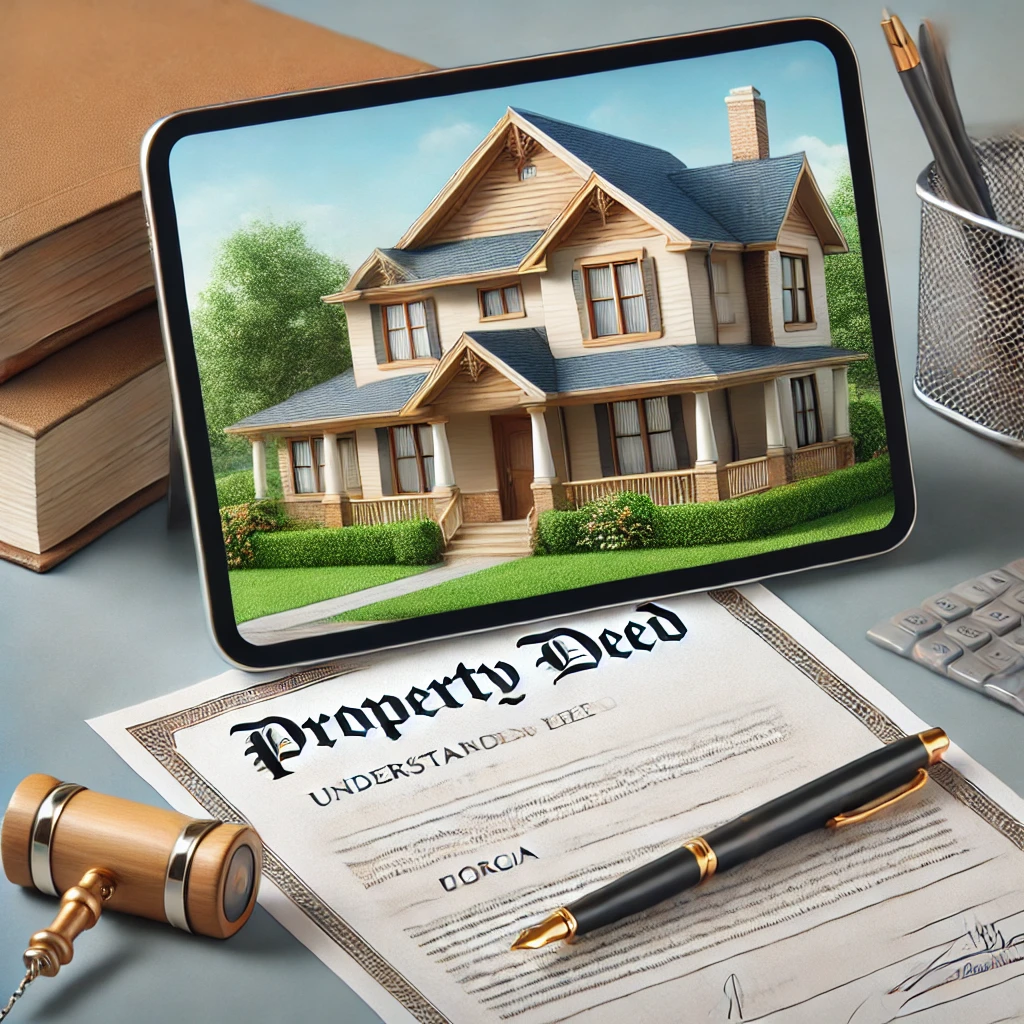Understanding Property Deeds in Georgia: Types, Uses, and Transfers

Understanding Property Deeds in Georgia: Types, Uses, and Transfers
Property deeds are legal documents that play a crucial role in real estate transactions in Georgia. Whether you're buying or selling a property, transferring ownership, or securing a loan, understanding the types of property deeds and how they work is essential. In this guide, we’ll cover the different types of property deeds in Georgia, their uses, and the steps for transferring ownership.
Types of Property Deeds in Georgia
Georgia recognizes several types of property deeds, each serving a different purpose in real estate transactions. The type of deed used can affect the level of protection the buyer receives, as well as the process for transferring ownership.
-
General Warranty Deed:
- A general warranty deed provides the highest level of protection to the buyer. It guarantees that the seller has clear title to the property and that the property is free from liens, encumbrances, or other claims. This deed also offers warranties that cover the entire history of the property, not just the time the seller owned it.
- Use: Typically used in standard residential real estate sales.
-
Special Warranty Deed:
- A special warranty deed only guarantees the property against claims or issues that arose during the seller’s ownership. It does not provide protection for any claims that existed before the seller took ownership.
- Use: Common in commercial real estate transactions or when selling investment properties.
-
Quitclaim Deed:
- A quitclaim deed transfers the grantor’s interest in the property to the buyer without offering any warranties or guarantees about the property’s title. The grantor makes no promises that the title is clear or that there are no claims against the property.
- Use: Often used for transfers between family members or in divorce settlements.
-
Security Deed:
- In Georgia, a security deed is used in place of a mortgage. The borrower conveys the property to the lender as collateral for the loan, giving the lender legal title to the property until the loan is fully repaid. If the borrower defaults, the lender has the right to foreclose on the property.
- Use: Commonly used in residential and commercial property financing.
How to Transfer Property Ownership Using a Deed
Transferring property ownership in Georgia requires executing and recording a deed. Here are the steps involved in transferring ownership:
-
Draft the Deed: The deed must be prepared, including the names of the grantor (seller) and grantee (buyer), a description of the property, and the type of deed being used.
-
Sign the Deed: The deed must be signed by the grantor in front of a notary public. In some cases, the grantee may also need to sign.
-
Record the Deed: After the deed is signed, it must be recorded with the county clerk’s office where the property is located. Recording the deed ensures that the transfer is legally recognized and becomes part of the public record.
-
Pay Transfer Taxes: In Georgia, property transfers are subject to transfer taxes, which are typically paid at the time of recording.
Common Uses of Quitclaim Deeds
A quitclaim deed is commonly used in situations where the transfer of property is between parties who already know each other, and the buyer is not concerned about title issues. Some common uses of quitclaim deeds include:
- Family Transfers: Quitclaim deeds are often used to transfer property between family members, such as when parents transfer property to their children.
- Divorce Settlements: In a divorce, one spouse may use a quitclaim deed to transfer their interest in the property to the other spouse.
- Correcting Title Errors: If there is an error on a property title (such as a misspelled name), a quitclaim deed can be used to correct the issue.
Understanding Security Deeds in Georgia
In Georgia, the security deed is a common document used to secure a loan for real estate purchases. It gives the lender legal title to the property, while the borrower retains equitable title (the right to use the property).
- Key Points:
- The lender holds the security deed until the loan is fully repaid.
- If the borrower defaults on the loan, the lender has the right to foreclose on the property.
- Once the loan is paid off, the lender releases the security deed, and the borrower gains full legal title to the property.
Security deeds differ from traditional mortgages because they allow lenders to more easily initiate foreclosure in the event of default.
Frequently Asked Questions About Property Deeds in Georgia
What is the difference between a warranty deed and a quitclaim deed?
A warranty deed offers protection to the buyer by guaranteeing that the seller has clear title to the property. A quitclaim deed, on the other hand, provides no such guarantees and simply transfers whatever interest the grantor has in the property.
Can I transfer property ownership without a lawyer?
Yes, you can transfer property ownership without a lawyer, but it’s recommended to seek legal advice to ensure the deed is properly drafted and recorded. Mistakes in drafting or recording the deed can lead to legal complications.
How do I file a property deed in Georgia?
To file a property deed in Georgia, you must take the signed deed to the county clerk’s office where the property is located and have it recorded. Recording the deed makes the transfer official and part of the public record.
What is a security deed in Georgia?
A security deed is used in Georgia to secure a loan for real estate. The borrower gives the lender legal title to the property until the loan is paid off, at which point the lender releases the deed.
Are property deeds public record in Georgia?
Yes, once a property deed is recorded with the county clerk’s office, it becomes part of the public record. Anyone can access these records to verify property ownership.
What happens if there’s an error on the property deed?
If there’s an error on the property deed, such as a misspelled name or incorrect property description, a corrective deed or quitclaim deed can be filed to resolve the issue.
Conclusion
Property deeds are essential legal documents that establish ownership of real estate in Georgia. Understanding the different types of deeds and how they are used can help ensure a smooth and legally sound transfer of property. Whether you’re buying, selling, or transferring property between family members, having the right deed in place is crucial.
For assistance with property deeds and real estate transfers, contact Gold Peach Realty at (770-283-1223) or visit us online at www.goldpeachrealty.com.
Categories
- All Blogs (590)
- Achasta Golf Community (76)
- Cleveland, GA (43)
- Dacula, GA (43)
- Dahlonega GA (113)
- Dawsonville, GA (44)
- Gainesville, GA (45)
- Gold Peach Realty (5)
- Helen, GA (44)
- Home Buying Tips (17)
- Home Décor And Interior Design (7)
- Home Improvement Tips (15)
- Home Selling Tips (20)
- Homes For Sale (45)
- Lake Lanier, GA (69)
- Local Events (13)
- Local Guides (17)
- Mortgage And Finance Tips (23)
- North Georgia (11)
Recent Posts










GET MORE INFORMATION

